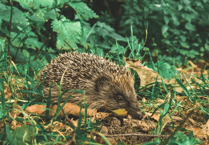The ManxSPCA will endeavour to help any animal in need, although it is most commonly associated with dogs and cats, and it works closely with other charities and government departments to achieve the best outcomes.
The Society collaborates with Island Horse and Pony Aid (IHPA) to work with horse, pony and donkey owners, giving them advice about correct husbandry and care, and checking that any necessary improvements take place.
We have a number of cases of equine cruelty and neglect in the island every year, but more often issues arise because of ignorance, and an owner being ‘over-horsed’ without sufficient funds or knowledge to care for the animal correctly.
The most common concerns relate to overgrown hooves, a horse that appears to be underweight, and in the summer months an overabundance of potentially poisonous ragwort in a paddock.
As well as genuine concerns, well-intended ignorance can also be the cause of many of the complaints that both the ManxSPCA and IHPA receive. The most common complaint is that a horse or pony isn’t wearing a rug, when others in the same field have them on.
In fact, the British Horse Society is concerned that too many owners are putting rugs on their equines without there being sufficient need to do so.
Over-rugging causes problems with weight gain (the equine doesn’t use up enough calories in heating itself) and ill-fitting rugs are uncomfortable for the horse or pony wearing them.
At this time of year it is preferable for a horse or pony to be a little underweight, because the spring grass is starting to come through.
The fertile grass of spring contains higher amounts of sugars and starches, and less fibre, than grass later in the season.
These sugars and starches ferment in the equine’s gastrointestinal tract and this, in turn, affects the balance of bacteria there. This can then trigger a very painful (and potentially fatal) disease called laminitis, which causes the hoof wall to detach from the leg.
A slimmer horse or pony is less likely to be affected by laminitis, but the disease is all too common and owners need to manage the amount of pasture and forage their equines can access.
Another well-intended but misplaced concern is that a horse or pony looks dishevelled.
At this time of year their winter coats are falling out and so they can look a little unkempt, but this is a natural process and they don’t need to be groomed.
In fact, horses and ponies who don’t wear rugs need to maintain grease in their coats which helps to make them waterproof. Their owners should stick to using a stiff-wired ‘dandy’ brush, and only brush the areas that need it such as where the saddle fits.
And another misconception that some concerned callers have about horses and ponies is that they always sleep standing up.
It’s true that they can, and often do, sleep in this way, but most equines like to lie down for a snooze. They will do this at any time of day, and can appear to be motionless. We’ve had quite a few calls about ‘dead horses’ in fields and so we always urge the caller to watch and wait for the equine to wake up.
Equines don’t necessarily need a stable or field shelter, but they do need to be able to escape the worst of the elements by having trees or large hedges in their field that will afford them some protection from wind and rain.
Of course, they also need fresh water; and if their field is muddy they need to have access to an area that is not muddy to prevent ‘mud-fever’ developing in their legs.
Finally, please never, ever feed someone else’s horse, pony or donkey without the owner’s permission. You don’t know what underlying health issue that equine may have, which could be made worse by giving them carrots or apples, or other treats.





Comments
This article has no comments yet. Be the first to leave a comment.